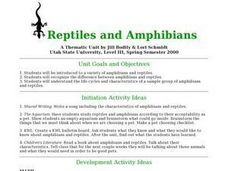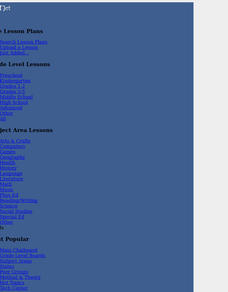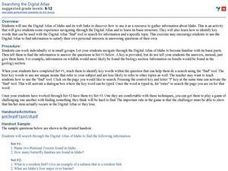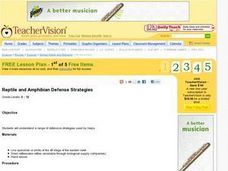Curated OER
Identifying plants, animals, insects, reptiles, and birds on the prairie
Students identify all of the plant an animal life on the prairie. For this plant identification lesson students divide into groups and draw sketches of things they saw on the prairie.
Curated OER
Animal Classes-Mammal Birds Fish Reptiles Amphibian
Students learn about the characteristics of each animal classification. In this animal classification lesson students will first learn the characteristics of each classification. Then, they will find animals from given materials and...
National Science Teachers Association
Hop into Action
Young scientists find out what makes amphibians such unique and interesting animals in this simple life science lesson. After looking at pictures and discussing the characteristics of amphibians, learners complete a series of three Venn...
Curated OER
The Anaconda
Students examine basic facts about the anaconda. They discuss the length of an anaconda, estimate the length of 33 feet, compare their estimate to the actual length, and decorate the paper snake with colored scales.
Curated OER
Chameleons Are Cool!
Have your learners review what they know about camouflage using this lesson. Learners fill out a graphic organizer listing what they know or have questions about. This could be enhanced with the addition of a writing assignment in which...
Curated OER
Animals Galore
A well-designed instructional activity which covers the characteristics of the animals found in the six animal groups is here for your young biologists. In it, learners divide up into six groups; the amphibians, reptiles, mammals, birds,...
California Academy of Science
Snakes and Lizards Length and Movement
Snakes and lizards can be very tiny or very long. Your class will get out their rulers to see just how big snakes and lizards can be. They discuss several different reptiles by reading the included animal fact cards, then each small...
Curated OER
Lori Schmidt's Lovely Lesson
Students color code a world map by region to show the different amphibians and reptiles that live there. They discuss the Nile Crocodile, Snapping Turtle, Komodo Dragon, Indian Python, and Lacertidae. When completed, they create a key...
Curated OER
The Bite of The Caiman
Students study about Caimans-large reptiles that live in Manu. They create a model of the bite of the caiman in a class activity. They calculate the length of the caiman from the size of the model bite.
Curated OER
Comparing and Contrasting a Desert Reptile and a Rainforest Mammal
First graders compare and contrast two different type of animals while also making predictions, observations, and asking provocative questioning. In this compare and contrast instructional activity, 1st graders acquire knowledge about...
Curated OER
Investigating Evolutionary Questions: Bats, Whales, Reptiles, Birds, Animal Classification
Students are guided through a process in which three questions are addressed by retrieving beta hemoglobin sequences from online databases, and using online tools to compare those sequences in student-selected animals.
Curated OER
Small Pond Creatures
Students complete a unit about the different creatures that can live in a small pond habitat. They create a glossary, create a class Small Pond mural, develop a Frog Fact File, read a variety of books, and conduct research for a report...
Curated OER
Plants and Animals
Students find common needs between plants and animals. In this plants and animals instructional activity students compare that both plants and animals need food and water. They also find the differences between plant and animal needs.
Curated OER
Cool It
Students simulate lizard temperature regulation. In this Science lesson, students use a thermometer as a pretend lizard. Students must keep their lizard within a particular temperature range while moving through a specified course.
Curated OER
Searching the Digital Atlas
Students become familiar with the tools of a digital atlas. They use a digital atlas of Idaho to located specified information. Students identify national forests, locate butterfly families, find examples of resident fish, and explore...
Curated OER
Reptile and Amphibian Defense Strategies
Students study the stages of the Eastern newt either by collecting a live specimen or from pictures. They note the colors of the eft stage before reading the "Eastern Newt Species Account" that shows the newt's life stages, migration,...
Curated OER
Name Match
In this name match worksheet, students match up fourteen various types of reptiles and amphibians to their formal names by drawing a line from one to the other.
Curated OER
Who Am I?
This worksheet allows learners to see animals and reptiles, and also clearly identify them. There are bats, rats, and more. Here you will find 16 clear and colorful pictures which children must match up with their animal names. This...
Curated OER
Snakes: Recycled Art
Make snakes with your class to demonstrate how recycled materials are perfect for art. Learners use colorful plastic cups, pantyhose, paper fasteners, and fishing line to make articulated snakes. This project would be great when learning...
Curated OER
Animal Categories
Students sort animal picture cards into classification groups such as mammals, reptiles, amphibians, insects and fish. They discuss the characteristics that each group of animals shares then arrange the pictures into a clasificatioon...
Curated OER
Desert Tortoise Adaptations
Students observe the Desert Tortoise in its natural surroundings. In this adaptations lesson, students study and take pictures of an animal in its habitat, then design a PowerPoint which addresses adaptations, biodiversity, and threats...
Curated OER
Rattling Review
Second graders watch a PowerPoint presentation, and distinguish between facts and myths about snakes. In this snakes lesson plan, 2nd graders discuss and review facts about snakes and summarize what they have inferred from the...
NOAA
Vertebrates I
I spy a spine. The 19th installment of a 23-part NOAA Enrichment in Marine sciences and Oceanography (NEMO) program explores vertebrate species, such as sharks and other fish. Learners take part in an activity evaluating the...
Other popular searches
- Reptiles and Amphibians
- Reptiles Worksheets
- Reptiles Life Cycles
- Reptiles Hands on Activities
- Reptiles Amphibians
- Amphibians and Reptiles K 2
- Reptiles & Amphibians
- Marine Reptiles
- Reptiles Lesson Plans
- Reptiles Introduction
- Collections on Reptiles
- Amphibians and Reptiles K

























